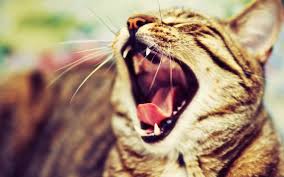caterwaul
英 [ˈkæt.ə.wɔːl]
美 [ˈkæt̬.ɚ.wɑːl]
- vi. 叫春;发出猫叫春的声音
- n. 猫叫春声;像猫叫春的声音

中文词源
caterwaul 猫叫
cat, 猫。-waul, 嚎叫,拟声词。
英语词源
- caterwaul
-
caterwaul: [14] The earliest known use of this word comes in Chaucer’s Wife of Bath’s Prologue 1386: ‘If the cat’s skin be slick and grey, forth she will, ere any day be dawned, to show her skin, and go a-caterwauling’. The first element of the word is generally accepted to be cat, while the second (in Middle English it was usually -wawe or -wrawe) is presumably onomatopoeic, imitating the sound of a cat wailing or yowling. It is not clear whether it was a purely native creation, or whether English borrowed it from Low German katerwaulen (where kater means ‘tom cat’).
- caterwaul (v.)
- late 14c., caterwrawen, perhaps from Low German katerwaulen "cry like a cat," or formed in English from cater, from Middle Dutch cater "tomcat" + Middle English waul "to yowl," apparently from Old English *wrag, *wrah "angry," of uncertain origin but all somehow imitative. Related: Caterwauled; caterwauling.